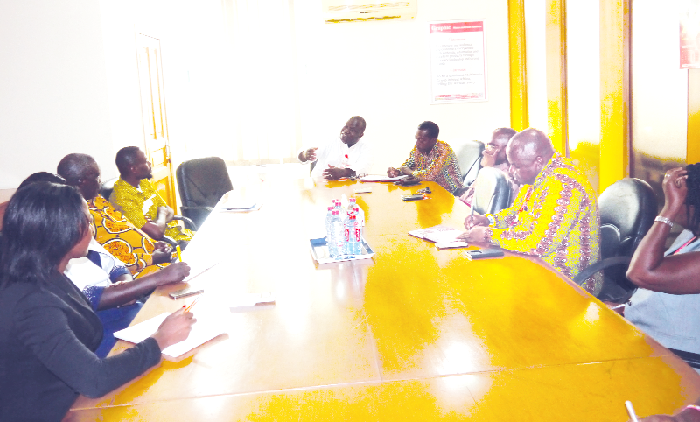The Managing Director of the Graphic Communications Group Limited (GCGL), Mr Kenneth Ashigbey, has underscored the need for strong collaboration among the media in Africa.
He said such a partnership would not only strengthen the continent’s media front but would also help propel the development of Africa.
“It is a shame that when something happens in Africa, we get to hear or see them on the international media. But we should be able to share information among ourselves within the continent,” Mr Ashigbey stated.
The MD stated this when a delegation from the Association for Media Development in South Sudan (AMDISS) paid a courtesy call on the management of the GCGL in Accra last Tuesday.
The visit was facilitated by the Media Foundation for West Africa (MFWA), which is the secretariat for the African Freedom of Expression Exchange (AFEX), a continental network of media organisations which has AMDISS as one of its members. The delegation visited the GCGL to familiarise itself with the operations of the company.
“Africa needs one voice”
Mr Ashigbey was of the view that the African media needed to come together to have one voice to push the developmental agenda of the continent and also empower the people on issues concerning them.
“When citizens are empowered with the right information, it helps them make the right decisions,” he asserted.
He further explained that the Constitution spelt out media freedom, rights and responsibilities, for which reason he charged media practitioners to hold people in positions of trust accountable.
The MD, however, observed that the delay in the passage of the Right to Information Bill was hindering access to information by the media.
Briefing the delegation on the GCGL, he said the organisation started operations in 1950 and that even though it was state owned, the company operated independently.
Delegation
For his part, the chairperson of AMDISS, Mr Alfred Taban, said the delegation was in Ghana to learn from their Ghanaian counterparts.
Giving highlights of media operations in South Sudan, Mr Taban, who is also the Editor-in-Chief of the Juba Monitor newspaper, said the media faced some challenges, including constant harassments by the government.
“We have situations where the government closed down media houses because publications did not favour it. My newspaper, for instance, had been closed down about three times and I was also detained for 13 weeks for publishing a story from the opposition party in South Sudan,” he claimed.
Mr Taban further indicated that sales and advertisements in the newspaper was poor, a situation which had led to the closure of many newspapers.
Nonetheless, in spite of the challenges the media was going through, he said “we have not turned away. We will continue to operate in the midst of the challenges and hope for the best”.
“Persevere”
Reacting to the observations of Mr Taban, the Director of Newspapers of the GCGL, Mr Yaw Boadu-Ayeboafoh, urged media practitioners to persevere in the face of challenges to assert their independence.
He said there was the need for the media to strive to give voice to the voiceless. He, however, admonished them to be circumspect in their reportage.
The Editor of the Daily Graphic, Mr Ransford Tetteh, said there was no absolute freedom of the press in the world as various jurisdictions had their own issues and challenges.


